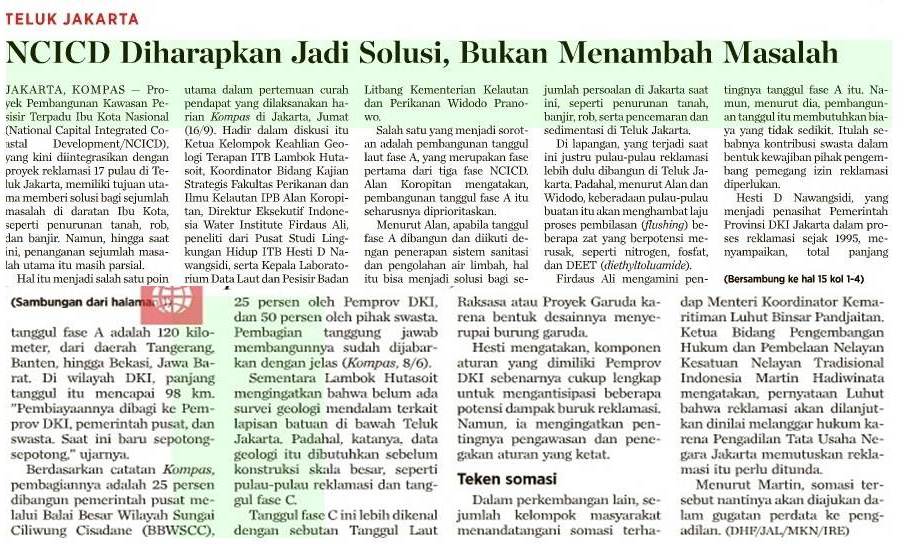KORAN TEMPO | Jumat, 25 Januari 2019 | METRO| Inge Klara Safitri & Vindry Florentin |


“I let my life flows to the ocean” | Perjalanan seorang bocah yang takut dengan air karena pernah tenggelam di sungai namun dikemudian hari berkarir di bidang kelautan.
KOMPAS Cetak, Kamis, 06 Juli 2017

JAKARTA, KOMPAS — Wacana pemindahan ibu kota negara dari Jakarta bisa menjadi momentum untuk membenahi perencanaan kota ini. Dengan wacana pemindahan ibu kota, konsep proyek Pembangunan Terpadu Pesisir Ibukota Negara yang target utamanya mengamankan Jakarta sebagai ibu kota negara harus ditinjau ulang.
”Rencana Badan Perencanaan Pembangunan Nasional untuk memindahkan ibu kota negara dari Jakarta menjadi bertentangan dengan proyek Pembangunan Terpadu Pesisir Ibukota Negara (PTPIN) atau yang lebih dikenal dengan NCICD,” kata Kepala Laboratorium Data Laut dan Pesisir Pusat Riset Kelautan Kementerian Kelautan dan Perikanan (KKP) Widodo Pranowo, di Jakarta, Rabu (5/7). Widodo mengatakan, jika rencana pemindahan ibu kota negara dari Jakarta ke kota lain bakal dimulai 2018 dan diprediksi memakan waktu tiga tahun, estimasinya harus selesai pada 2020 atau 2021. Padahal, cetak biru NCICD yang telah diperbarui pada akhir 2016 salah satunya menyiapkan ”Tahap D” yang bersifat mendesak dan harus dilaksanakan adalah periode 2017-2019. Tahap D berupa pembangunan tanggul pantai sepanjang 20,1 kilometer, drainase, pompa, dan pintu air yang diperkirakan menyedot anggaran Rp 3,7 triliun.
Read More KOMPAS: Pemindahan Ibu Kota, Momentum Benahi Perencanaan Jakarta
JAKARTA, KOMPAS — The National Capital Integrated Coastal Development (NCICD) project, which is currently integrated with the reclamation project of 17 islands on Jakarta Bay, was created to provide solutions for a number of problems in the capital city, including land subsidence and flash floods. However, until now, some of these problems have only been handled partially.
![The Coast and Sea Data Laboratory Head of the Marine and Fisheries Ministry's Research and Development Body, Dr. Widodo Pranowo, gives a presentation as part of a brainstorm event on the Jakarta Bay reclamation at the Kompas newspaper office in Jakarta on Sept.16. Also in attendance were Bandung Institute of Technology (ITB) Environment Study Center Researcher Hesti D Nawangsidi, ITB Applied Geology Expertise Group Head Prof. Dr. Ir. Lambok Hutsoit MSc, Bogor Institute of Agriculture Fisheries and Marine Science Faculty's Strategic Study Coordinator Alan F Koropitan PhD and Environmental Engineering researcher and lecturer at University of Indonesia Faculty of Engineering's Civil Engineering Department and Indonesia Water Institute Executive Director, Dr. Firdaus Ali. [Kompas/LUCKY PRANSISKA]](https://widodopranowo.id/wp-content/uploads/2016/09/ncicd-kompas-wpranowo-2016.jpg)
This was one of the major points of the discussion held by Kompas in Jakarta on Friday (16/9/2016). Attending the discussion were Bandung Institute of Technology (ITB) applied geology research group head Lambok Hutasoit, Bogor Agricultural Institute (IPB) fisheries and maritime sciences faculty strategic research coordinator Alan Koropitan, Indonesia Water Institute executive director Firdaus Ali, ITB center for environmental studies researcher Hesti D Nawangsidi and Maritime Affairs and Fisheries Ministry marine and coastal data laboratory head Widodo Pranowo.
One highlight in the discussion was the construction of Phase A of the sea wall, which was the first of NCICD’s three phases. Alan Koropitan said that the construction project should be prioritized. According to Alan, the construction of the project and the implementation of sanitation and wastewater management systems can provide solutions for a number of problems in Jakarta, including land subsidence, flash floods and pollution and sedimentation in Jakarta Bay.
In the field, the reclamation islands’ construction is prioritized in Jakarta Bay, whereas Alan and Widodo said that the man-made islands would obstruct the flushing process of a number of potentially damaging chemical substances, including nitrogen, phosphate and DEET (diethyltoluamide).
Firdaus Ali agreed with the importance of the Phase A construction of the sea wall. However, he said that the construction project needed a huge amount of money. This is why private sector contribution in the form of social responsibility projects by the developers holding reclamation licenses is necessary.
Hesti D Nawangsidi, who has advised the Jakarta administration in the reclamation process since 1995, said that the total length of the Phase A sea wall was 120 kilometers, stretching from Tangerang in Banten to Bekasi in West Java. In Jakarta waters, the sea wall would be 98 kilometers long. “The financing is split between the Jakarta administration, the central government and private entities. Currently, the progress is partial,” she said.
Kompas reports show that 25 percent of the project is constructed by the central government through the Ciliwung-Cisadane Flood Control Office (BBWSCC), another 25 percent by the Jakarta administration and the remaining 50 percent by private companies. This share of responsibilities has been detailed clearly (Kompas, 8/6/2016).
